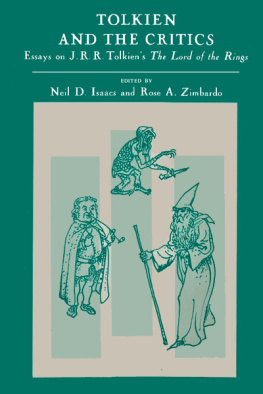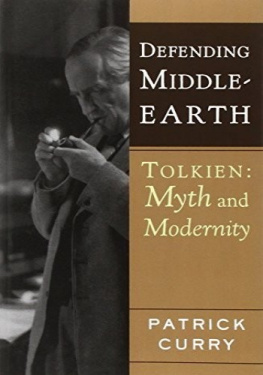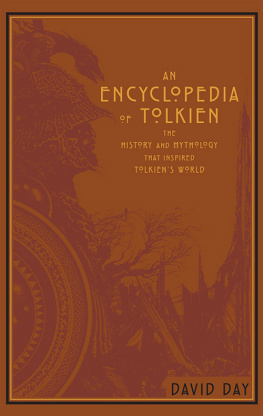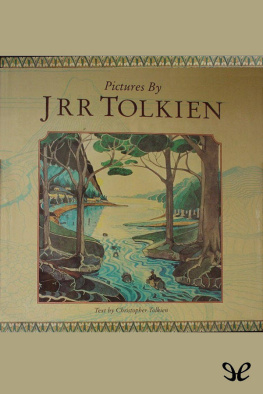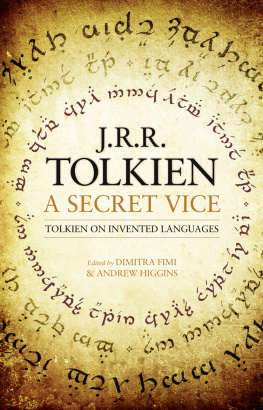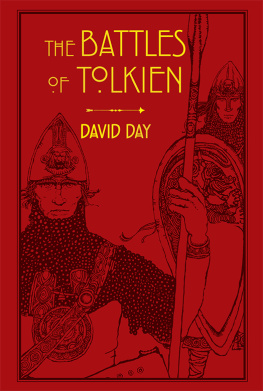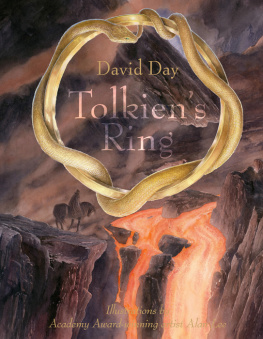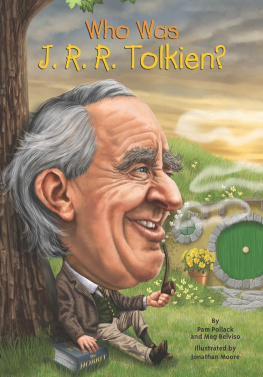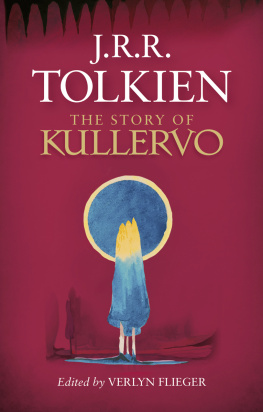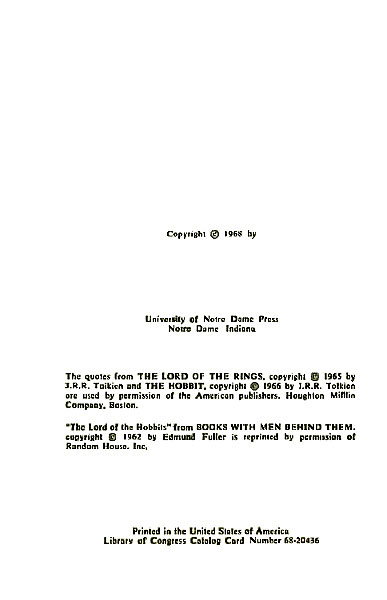TOLKIEN
AND THE CRITICS
Essays on J R R Tolkien's
The Lord of the Rings
EDITED BY
Neil D. Isaacs and
Rose A. Zimbardo
1st Edition, 1968
J.R.R. Tolkien has defined fantasy as the making or glimpsing of other worlds. The other world he invented is Middle Earth, with its own geography, mythology, balladry, history, languages, alphabet, flora and fauna, poetry, and other necessary tangible and intangible elements of culture. The most interesting subjects are the populus: hobbits, dwarves, orcs, ents, and other Tolkien-invented creatures.
Good and evil have not changed... nor are they one thing among Elves and Dwarves and another among men. This is the basis of the whole Tolkinian world. Because of the manner in which evil is defeated and good triumphs, some readers have interpreted The Lord of the Rings in Christian terms.
The popular success of this work has no logical explanation, for it is the product of adulation caused by a variety of nonliterary cultural and social phenomenons. It should be noted that the enormity of the current Tolkien popularity has been a detrimental force to critical activity even though this popularity grew from the trilogy's own excellence rather than from the influence of mass media.
The fifteen essays in this volume include previously published critiques along with several original treatments, having the single purpose of serious criticismto render judgment on a work of art. The essays shift the emphasis from extraliterary aspects of the trilogy and its audience to a consideration of the work itself, and in doing so they answer some of the basic problems about genres, influences, sources, relationships, and other pertinent aspects. The Lord of the Rings critiques also examine not literature, allegory, symbolism, structure, missing elements, and humour.
FOREWORD
All quotations from The Lord of the Rings are taken from the revised edition (Boston, 1967), and we are grateful to Houghton Mifflin Company for their cooperation; citations will appear parenthetically in the text by volume and page numbers. All references to The Hobbit are to the Houghton Mifflin edition (Boston, 1938). References to Tolkiens essay On Fairy-Stories are to Essays Presented to Charles Williams (London, 1947), pp. 38-89, except in Burton Raffels essay where, because of frequent cross-references to Leaf by Niggle, citations are to Tree and Leaf (London, 1964). References to Tolkiens lecture Beowulf: The Monsters and the Critics are to An Anthology of Beowulf Criticism, ed. Lewis E. Nicholson (Notre Dame, Ind., 1963), pp. 51-103.
For permission to reprint we are grateful to the editors of Time and Tide for C. S. Lewis, The Dethronement of Power, October 22, 1955; to Random House and Edmund Fuller for The Lord of the Hobbits from Books with Men Behind Them (New York, 1962), pp. 169-196; to the editors of The Texas Quarterly and W. H. Auden for The Quest Hero, iv (1962), 81-93; to the editors of Critique and Patricia Meyer Spacks for material from Ethical Patterns in The Lord of the Rings III (1959), 30-42; to the editors of Niekas and Marion Zimmer Bradley for Men, Halflings, and Hero-Worship in #16 (Summer, 1966); to the editors of Thought and Robert J. Reilly for Tolkien and the Fairy Story, xxxviii (1963), 89-106; to University of Florida Press and Charles Moorman for The Shire, Mordor, and Minas Tirith from The Precincts of Felicity (1966), pp. 86-100; and to the editors of The Hudson Review and Roger Sale for material from Englands Parnassus: C. S. Lewis, Charles Williams, and J.R.R. Tolkien, xvii (1964), 203-225. We are also grateful to all other contributors for their original essays and for their cooperation: Tom Gasque, Hugh Keenan, Mary Kelly, Burton Raffel, Roger Sale, and last but not least John Tinkler; and to Anne Kozak for her faithful editorial services.
TABLE OF CONTENTS
| 1. | Neil D. Isaacs |
| 2. | C. S. Lewis |
| 3. | Edmund Fuller |
| 4. | W. H. Auden |
| 5. | Hugh T. Keenan |
| 6. | Patricia Meyer Spacks |
| 7. | Rose A. Zimbardo |
| 8. | Marion Zimmer Bradley |
| 9. | Robert J. Reilly |
| 10. | Thomas J. Gasque |
| 11. | John Tinkler |
| 12. | Mary Quella Kelly |
| 13. | Charles Moorman |
| 14. | Burton Raffel |
| 15. | Roger Sale |
ON THE POSSIBILITIES OF
WRITING TOLKIEN CRITICISM
Neil D. Isaacs
THIS IS SURELY A BAD TIME FOR TOLKIEN CRITICISM. Stories in Holiday, Esquire, Saturday Evening Post, Saturday Review, and the Luce(fer) publications, to say nothing of the feverish activity of the fanzines, do not produce a climate for serious criticism. Nor does the fact that The Lord of the Rings and the domain of Middle-earth are eminently suitable for faddism and fannism, cultism and clubbism encourage scholarly activity. Tolkiens enormous current popularity itself acts as a deterrent to critical activity, as it has for other contemporary writers. Usually, when initial critical reception has been so warm that it has contributed to great popular success (as with Durrell, Cozzens, Salinger, Golding, Bellow, and even Mailer), the resultant popular success has apparently occasioned critical second-thoughts, with revaluations downward. But this recurrent phenomenon has not really had any effect on Tolkiens reputation. One difference is that the Tolkien mass popularity was not fostered by the mass media; it grew from the excellences and appeals of the work itself and was simply reported in the media. There never was any promotional bandwagon for Tolkien. But the major difference is that there never was a critical bandwagon either.
The first reviewers were full of praise and awe but also full of contradictions and questions, particularly about genre and ultimate significance. Subsequent reviewers, with some egregious exceptions on both sides of the water, continued the praise and began proposing answers to some of the questions. But from the beginning critical studies appeared only occasionally, and though they have continued to appear, the occasions have not become more frequent. We have assembled here the best of the previously published work on Tolkien (with two exceptions) and added eight original pieces. The essays of C. S. Lewis, W. H. Auden and Robert J. Reilly, as well as the chapter from Charles Moormans Precincts of Felicity, appear without change. Patricia Meyer Spacks has revised her original article, and Edmund Fuller has made some significant additions to his chapter from Books with Men Behind Them. Marion Zimmer Bradleys essay has been considerably revised.
The first exception is Roger Sales Englands Parnassus: C. S. Lewis, Charles Williams, and J. R. R. Tolkien. Mr Sale has completely reworked his material to provide a new cogent essay focused specifically on Tolkien. Touching on several of the points raised in this introductory essay, Sales Tolkien and Frodo Baggins seems to me the piece de resistance of the collection and incidentally answers Burton Raffels charges of not literature with a careful case for great literature. The second exception is the dissertation of Marjorie Evelyn Wright, The Cosmic Kingdom of Myth: A Study in the Myth-Philosophy of Charles Williams, C. S. Lewis, and J. R. R. Tolkien (University of Illinois, 1961). Because of Miss Wrights untimely death, the dissertation itself was never quite completed, and though it contains a great deal of valuable material we have decided, at least for now, not to extract and reorganise parts of it.

